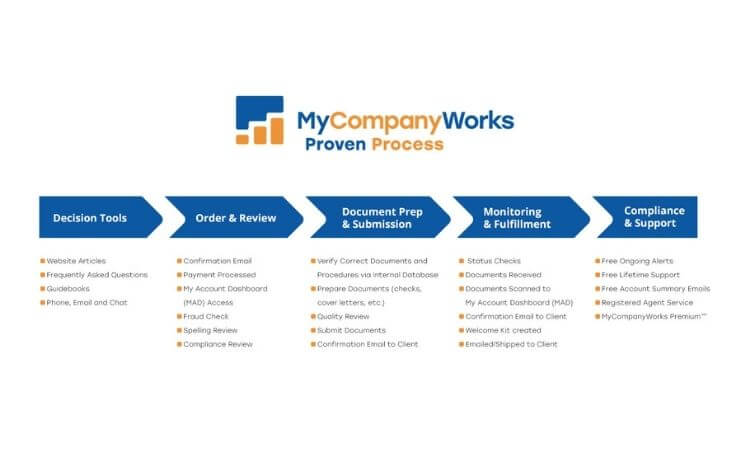What Are Legal Services?
You can think of legal services as an alternative to traditional law firms. An online legal service site connects you to independent legal experts who offer bespoke legal services on an as-needed basis. If you don’t want to hire a personal attorney, a legal services site can help you find a qualified expert to help you apply for licenses, create contracts, and/or submit documents without the commitment or fees associated with traditional law firms. Legal services typically cater to small business owners, though some offer services for personal legal matters as well.
Online Legal Services Pricing
You've probably noticed that online legal services vary greatly when it comes to pricing. The biggest variance relates to what services are included in the plans. If a company offers Registered Agent Services within a plan, it's going to be more expensive. This is a service that can be well worth the price tag, however, since most businesses are required to have a registered agent of some kind involved.
In general, you can expect to pay in the range of from $80-$150 for standard limited liability company services. Incorporation formation is slightly higher. Here is a list of typical pricing, though these prices will vary from company to company:
How Do They Work?
The process is simple, which, of course, is the point. After submitting a form explaining the service you need, you'll be assigned a professional who will discuss the particulars involved in this specific task. A lawyer can research, complete, and submit documents for you - or can simply provide you with template forms and the guidance necessary to do it yourself. The process varies depending on the task at hand, but the goal is to reduce your legwork, whether this is by hiring an expert to get you started or by obtaining as-you-go guidance to help expedite the process.
What Services Do They Provide?
The majority of legal service sites are directed at the needs of small or emerging businesses. Services range from filing LLCs to drawing up contracts, researching bylaws, registering trademarks, and applying for permits.
That said, there are online legal services that also help with personal matters and that, as such, pair you with legal experts who specialize in mortgage agreements, matters of immigration, power of attorney, living wills, and more.
What Is an S Corp, C Corp and LLC?
One of the first choices a business owner faces is deciding which kind of business entity to open—a C corporation, or an LLC, or even S corporation (just for fun), which isn't the the name of a business type. Here’s what you need to know about each entity.
LLC
Limited Liability Company is an attractive concept for business owners, as it provides some personal financial protections from business downturns as well as flexibility in taxation and management. It can be taxed as a sole-proprietorship or multi-proprietorship, but either way, business owners avoid corporate taxes and keep their personal bank accounts separate. Owners of LLCs are generally considered self-employed and subject to self-employment taxes. However, these owners may not issue stocks, and their businesses are not recognized outside of the United States. Additionally, these business owners are not subject to double tax, so CEOs pay personal taxes only, which, incidentally, also saves them a lot of time filling out paperwork.
C Corporation
A corporation is a company that is its own legal entity in the eyes of the government and is owned by shareholders. The stocks belong either to the founders of the company or to individual investors (or both). Like an LLC, it’s an official business that is separate from personal liability and personal assets. Because it’s taxed as an entity, shareholders are “doubly taxed” - once on personal income and once on business income. This structure allows businesses to earn money or build partnerships abroad using investor funds to get business off the ground. Further, corporations must select a Board of Directors, and there are significantly more bookkeeping and reporting requirements than with an LLC.
S Corporation
A small business corporation is not actually a business type but, instead is an IRS tax classification. Your business will be registered as either an LLC or C corp, but it can then qualify for S Corp status. Your business can become an S Corporation as long as it’s based in the U.S., has fewer than 100 members, and, if it’s a corporation, has only one class of shares. In an S corp, the corporation doesn’t pay tax on its profits, so the business is only taxed in terms of individual shareholders. This saves owners from the double taxation that C corps usually face. S corps are also subject to slightly less frequent reporting, which is a benefit over the traditional C corp tax classification. An S corp is subject to some additional scrutiny by the IRS, and it isn’t great for companies looking for venture capital funds.
How to Choose the Right Legal Services Site for Your Business
The first step in choosing a legal service site is deciding how much involvement you’d like to take on. Some sites offer legal forms and templates for you to fill out yourself, along with step-by-step instructions, guidance, and real-time edits to help you along. Other services take care of the documentation themselves. For more extensive projects and those that require field research, such as patent and copyright filing, it’s best to find providers that understand the field and specialize in the intricacies of the matter at hand. Further, if you’re launching a new business, you’ll want to find an expert who understands taxation, licensing, and state and local laws.
Most importantly, though, you need to find a trustworthy company. Regardless of what you’re using the service for, chances are that you’ll be sharing sensitive information and dealing with important matters. Pay attention to the company’s reviews and reputation and make sure the website is professionally designed with working contact information. While you're at it, take a look at how active they are on Facebook. These can all be important factors when it comes to choosing the right legal services provider.
How Will a Legal Services Site Help Your Business?
First and foremost, legal services help you—the business owner—which, in turn, helps your business get off on the right foot and continue to develop and grow. By taking on difficult legal procedures, such as forming an LLC, parsing licenses and permits, and researching bylaws, a legal service site can eliminate hiccups that could otherwise stall the process, distract you from your business plan, and lead to fines and other violations of red-tape. They can save you the expenses of a personal attorney while leaving you free to shift your attention to your unique vision and the implementation of your business plan.
ZenBusiness is a leading legal services provider and a popular choice amongst people with all types of needs. Other top services include Bizee and Swyft Filings.
Online legal service providers offer advice on business and personal matters. Today there are many online legal services that offer a wealth of solutions ranging from filing tax paperwork to helping you launch a business. Oftentimes these services are provided in tandem with helpful guides, tutorials, and legal consultations.
Some law firms and online legal services offer resources and advice to help you understand the divorce process. More in-depth divorce services, however, will likely cost money.





















